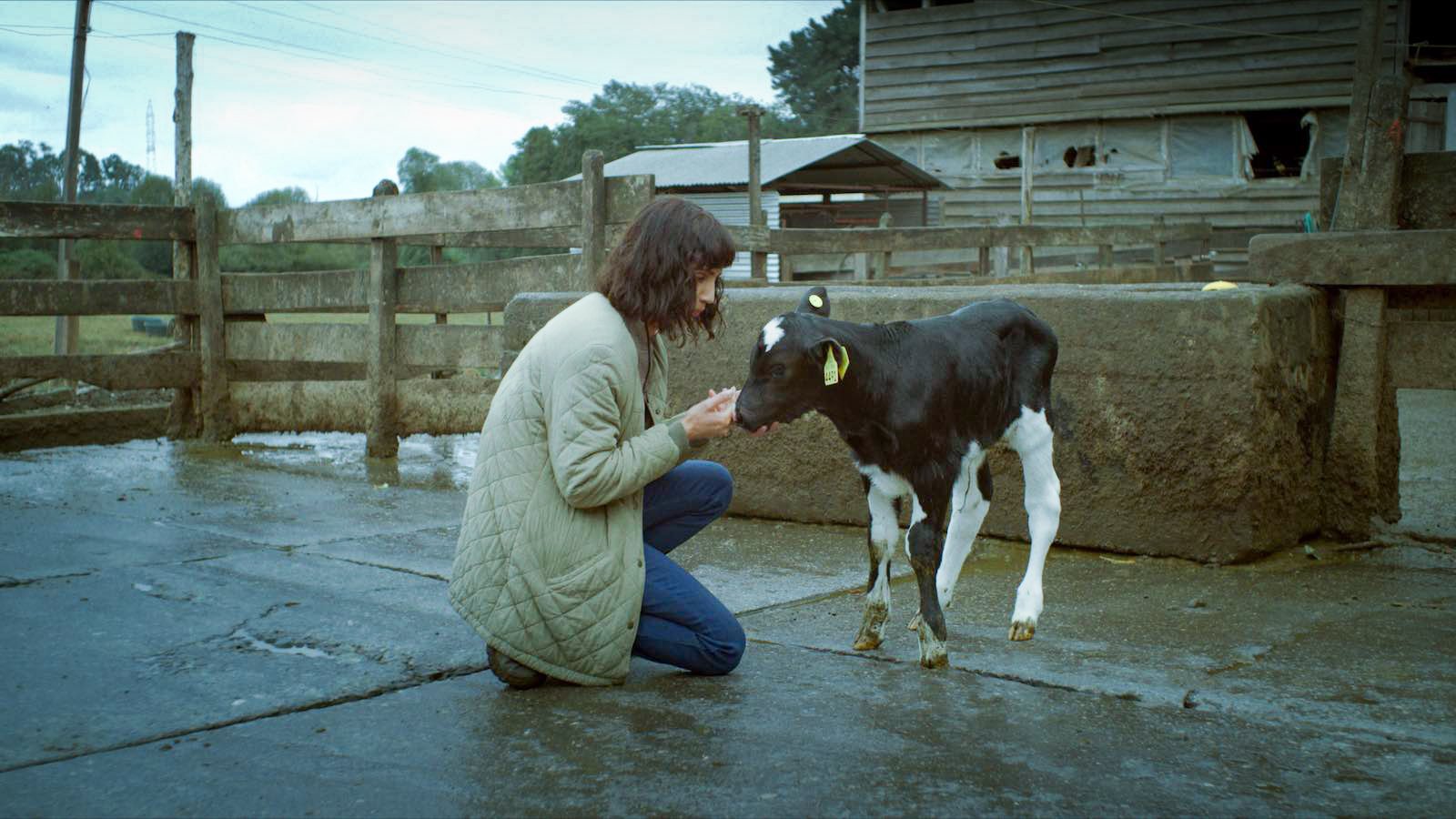The Cow Who Sang A Song Into The Future (2022) Movie Review: Cinematically speaking, if there is one animal that has become the poster child for animal liberation, it is cows. The shocking statistics in Cowspiracy (2014), which lobbied against widespread bovine farming, soon became a go-to campaign film used by animal liberationists. More recently, indie filmmaker Andrea Arnold also turned to a mother cow for her realist documentary The Cow (2021) to highlight the tragic life of a dairy cow on an English farm.
And now, director Francisca Alegria in her feature debut, The Cow Who Sang A Song Into The Future (2022), employs a similar framework to wield an ecofeminist critique against human exploitation of our four-legged companions. But as its surreal title already alerts us, the film is a magical realist take on the subject with plenty of profound thematic underpinnings.
Alegria begins her film with a shot of a decaying rat in a Chilean forest—the ominous music in the background already alerts us to further images of death. Soon after, we are shown corpses of fish near the river, which we later learn are dying from the waste dumped by the nearby pulp industry.
Amidst this natural catastrophe, a woman called Magdalena (Mía Maestro) rises from inside the water. If her clothes and the rustic helmet in her hand do not signify her anomaly, Magdalena’s childlike inquisitiveness certainly does. It turns out that years ago, Magdalena had committed suicide by driving her bike into the very same river from where she just emerged. As Magdalena makes her way to the town, a chance encounter with her now old-husband, Enrique (Alfredo Castro), gives the latter a heart attack.
Enrique’s son, Bernardo (Marcial Tagle), immediately ends up calling his sister, Cecilia (Leonor Varela), a doctor who lives in the city. Cecilia also tags along her two children, including her transgender daughter, Tomas (portrayed by actor Enzo Ferrada Rosati). Cecilia refuses to acknowledge Tomas’s gender identity causing a rift between the two.
When Cecilia and her kids end up in the countryside, they encounter a group of bike-riding youth activists who are protesting the ecological crisis in the river Cruces, where fish are dying by the numbers. But Cecilia soon realizes that the problem is not just in the river as the cows in the family farm (run by her father and brother) also start to behave strangely.
Does Magdalena’s resurrection signal something optimistic about these man-made calamities, or will her return cause tension within her already dysfunctional family? Even though Alegria’s narrative features several obtuse and surreal symbolism, her ideological leanings are pretty apparent. She borrows not just from the popular discourse on climate change brought upon by capitalism but also from the current animal liberation politics.
It is precisely the focus on the latter that gives the film its radical polemic. Often, films evoke a hollow message of environmentalism that preaches saving an idea of ‘nature’ (usually through deforestation) but not the sentient beings that inhabit it. Alegria challenges this anthropocentric activism by mounting criticism of the exploitation of animals at the hands of the homo sapiens.
In one particular shot, cinematographer Inti Briones lingers his camera on the cow’s teats during a milking sequence. Rather than indulge in the aesthetic beauty of the milking process (as dairy advertisements frequently employ), the ominous score by Pierre Desprats accentuates the horror of this process. A more obvious stance is made apparent during a sequence where Cecilia’s daughter questions the raping of cows via artificial insemination and the separation of baby calves from their mothers.
If these ideas seem to be too inspired by a vegan TikTok or documentary, Alegria deftly aligns her pro-animal liberation rhetoric with ecofeminist concerns. The surreal sequence hinted by the title of the film involves a mother cow ‘singing’ about being kept away from her own child.
Furthermore, the capitalist patriarchy in the film is represented by Enrique, Cecilia’s father, who is a dairy farmer bent on making the most profit from the cows with the least care about their well-being. An antithesis to Enrique is his wife, Magdalena, an almost nature goddess who causes every man-made electrical object to go berserk in her presence. Alegria also deftly places queer politics within her ecofeminist concerns via the character of Tomas.
Ridiculed by the transphobic world around her, Tomas seeks escape from the martinet eyes of her mother. In a heartbreaking sequence, she confides to her grandmother how she would never wish to return back to this cruel world even if she were given a second chance. Through the film, Alegria seems to suggest that a utopian ecofeminist society would enable liberation not just for the animals but also for other minorities as well.
Mía Maestro remains taciturn throughout the film—her silence leveling her to the level of animals who do not have the recourse to speech. Yet Maestro, like the bovine performers in the film, conveys so much sympathy and anger through her eyes and face. Enzo Ferrada Rosati, in their nuanced performance, echoes the existential dilemma that Tomas faces navigating life in an unaccepting world. Another standout performance comes from Alfredo Castro as a patriarch unwilling to accept the damage he has created in the environment and in his own family.
The Cow Who Sang A Song Into The Future is a solid debut that showcases Alegria as a radically empathetic filmmaker, cognizant of the exploitation and injustice around her. Yet, while beautifully shot, Alegria’s conclusion to the film feels a bit restrained, considering the ominous and thrilling tone the film established earlier.
Even though there is a semblance of poetic justice served in the end, the meek execution leaves a lot to be desired. But overstuffed as it is with potent themes, Alegria’s film is never unprovocative. It conveys its message with much dexterity, showcasing her as an intelligent filmmaker capable of raising relevant discourses via narrative filmmaking.







